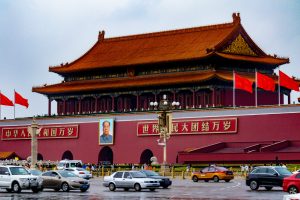What does it mean when a regime speaks the language of ancient virtue but enforces it through curriculum mandates and ideological scorecards? The opening essay of Simulated Sagehood, a five-part series, traces how Confucianism has been reconstructed, not as a living tradition, but as a calibrated instrument of bureaucratic control.
Through textbook reform, propaganda choreography, and institutional incentives, Xi’s China fuses ethical language with Leninist mechanics. The result is not revival but simulation: a Confucianism of surfaces, stripped of its moral interior.
The return of Confucian language under Chinese leader Xi Jinping isn’t a spontaneous cultural revival. It’s a carefully orchestrated campaign — engineered from the top of the Chinese party-state — to wrap centralized political control in the language of ancient virtue. What’s unfolding is a quiet reversal: values once rooted in moral constraint, like filial piety, virtue, and ethical cultivation, are being refitted to serve a system built on obedience and authority. This isn’t Confucianism reborn. It’s a state-authored script, stitching together the vocabulary of tradition to legitimize modern power.
The turning point came in 2013 with a little-known but foundational document: the Communiqué on the Current State of the Ideological Sphere — more commonly known as Document No. 9. Here, the Chinese Communist Party elevated “cultural security” to the same strategic level as political or cyber defense, identifying “Western constitutional democracy,” “universal values,” and “historical nihilism” as existential threats. The proposed solution wasn’t dialogue or reform, but insulation: Confucian culture would be deployed as a kind of ideological firewall, meant to inoculate China against liberal ideas.
This approach was codified in the 2017 Opinions on Implementing the Inheritance and Development Project of Excellent Traditional Chinese Culture — a mouthful of a title, but one with clear intent. It brought Confucian texts under the wing of national security. The classics were no longer seen as sources of independent moral insight, but as symbolic tools linking the Communist Party to an unbroken Han civilizational arc.
The machinery driving this transformation spans a vast web of state organs: the propaganda system, the education bureaucracy, and the united front system — a structure designed to manage intellectuals, religious groups, and diaspora networks. Each branch reshapes Confucian motifs to suit its own mission. After the Central Propaganda Department issued its 2015 Action Plan for promoting “core socialist values,” local governments were told to inject concepts like li (ritual), xiao (filial piety), and zhong (loyalty) into school posters, radio scripts, and CCP publications. But these concepts are no longer invitations to ethical reflection. Xiao is reframed as deference to political authority. Zhong — which once carried the tension between loyalty and principled dissent — is reduced to personal allegiance to Xi as the party’s “core.” These values aren’t interpreted; they’re rebranded as slogans.
The shift is institutionalized most clearly through the Ministry of Education. In 2017, under State Council directive No. 61, the government established the National Textbook Committee, chaired by a vice premier and staffed by Marxist theorists and propaganda cadres. Its job? To vet all school textbooks for ideological conformity. Accuracy — whether philological or philosophical — takes a backseat. By 2019, new standardized textbooks in literature, civics, and history began inserting handpicked excerpts from the Analects, the Classic of Filial Piety, and the Zhongyong (Doctrine of the Mean). These insertions weren’t meant to provoke classical interpretation. One widely noted example pairs Mencius’ famous line, “When the ruler is upright, the people will follow,” with a photo of Xi visiting a poor village. The message is clear: Xi doesn’t just rule — he continues a civilizational mandate.
This symbolic fusion reached a new level in 2021 with the launch of the Three-Subject Unified Textbooks (三科统编教材). For the first time, Xi Jinping Thought became mandatory reading in all public primary and secondary schools — including in ethnic minority regions. Sayings like “The noble man cultivates himself to govern family and state” (君子修其身以齐家治国) now appear alongside directives to “love and follow the party’s core, General Secretary Xi.” Confucian virtues are no longer positioned as part of an ethical journey. They are cast as historical truths — completed, fulfilled, and embodied in CCP rule. What remains of Confucian discourse is the scaffolding. The meaning has been hollowed and refilled with political certainty.
Since 2020, this “Confucianism with CCP characteristics” has become part of institutional performance. The state now applies ideological-political quality assessments (思想政治素质考核) to teachers, cadres, and schools. The Eight-Ministry Opinion of 2020 explicitly links results from these evaluations to funding decisions, promotions, and curriculum approvals. By 2023, the National Cadre Education and Training Plan designated the study and application of Xi Jinping Thought as the key test for political fitness. Provincial party academies now use numerical dashboards to track how often officials invoke “excellent traditional culture” in speeches, papers, and events. In this environment, Confucian vocabulary doesn’t function as ethical language. It becomes metadata — an ideological KPI, measurable and monetized. The tradition survives not as thought, but as performance.

































